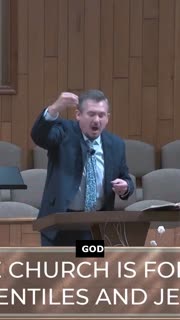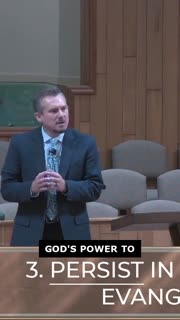God's Redemptive Plan: Unity, Perseverance, and Restoration
Devotional
Sermon Summary
Bible Study Guide
Sermon Clips
1. "God's goal has not been to discard Israel. He wants to use our faith to make Israel jealous and so Israel would reclaim their covenant role that God has prophesied about. God has shown grace to undeserving Gentiles so that he might stir jealousy in Israel. I like to say it this way: this is Josh's theology of it. God wants to win the whole world back to win Israel back. That's amazing." [34:18] (30 seconds)
2. "Paul knows that he is playing a key part in advancing the totality of God's plan. His main focus on reaching Gentiles, he wants to reach them because the more he reaches us, the more jealous he makes the Jews. So we're talking about we're being reached indirectly through Paul so that he might reach his own people and that they might see Jesus as well." [37:30] (26 seconds)
3. "Paul teaches that the first part, let me read that to you, so he's kind of adjusting the analogy now. He's going to begin to use this olive tree and first fruits and root analogy that you saw him use for the majority of the text. Look at verse 16 real quick. It says, 'Now if the first fruits are holy, so is the whole batch, and if the root is holy, so are the branches.'" [39:12] (26 seconds)
4. "God takes wild, unruly people like us and he has grafted us into his family tree. That's the miracle of salvation. Now here's what's so amazing: if you go and study especially the book of Galatians, here's what I love is that you and I now, we share the same nourishment as the root. I want you to catch this: Abraham, Isaac, and Jacob, they are our patriarchs and forefathers too." [42:22] (35 seconds)
5. "Paul warns you and I from feeling superior to the Jews who have fallen away. God's covenant with Israel is the source of our spiritual life. If you go back and look, all of the covenant blessings we receive, they were first promised to Israel, first given to them, and it's only because we've been grafted into Israel that we experience these covenant blessings." [44:08] (26 seconds)
6. "Paul contrasts Israel's unbelief with the Gentiles' firm faith. Do you see where it said 'stand firm' or 'stand fast'? This is one of the harder verbs to translate into English and it's because of the Greek tense that's here. The Greek tense for 'stand firm' or 'stand fast' in Greek, it's the perfect tense. The perfect tense in Greek means this: it means to enter into a state with ongoing results." [49:26] (39 seconds)
7. "A healthy fear, a fear of God, will keep us humble and aware of our need for him. This is one of my favorite things that I found this week. This is a part of God's covenant blessings to Israel that you and I have been grafted in on. Look at what God's promise is to Israel and to us by virtue of our connection with Christ by faith. Listen, Jeremiah 32:40, 'Our God will make a permanent covenant with them.'" [51:14] (29 seconds)
8. "God's grace is never guaranteed. He judges righteously. He knows when to administer and when he goes, 'and that's enough.' Paul warns, notice what he says in verse 22b. Look at that. 22b, he says, 'Consider God's kindness and severity, severity toward those who've fallen, but God's kindness toward you.' And remember what I just said a minute ago about abiding in the root, abiding in the vine. Notice this phrase: 'If you remain in...'" [01:04:06] (29 seconds)
9. "Paul says Israel can be restored if they turn from their unbelief. It reminds us, saints, as much as hardening is a reality. It's a reality. That's a biblical truth. But no one is beyond God's grace because God goes, 'I'll have mercy on a hoop. I'll have compassion. I'll do this.' We can reach out to God and God goes, 'Yes, let's save them.' That's very possible." [01:06:28] (23 seconds)
10. "God's power to restore is greater than our power to rebel. You can read this all through Romans, where sin abounds, grace super abounds. That's what it says. It can get past that, okay? God is more quick to forgive us than we are to sin. That's amazing. He just says, don't presume upon my grace. Don't presume upon my grace. He holds that intention." [01:11:22] (23 seconds)
Ask a question about this sermon
2. "Paul knows that he is playing a key part in advancing the totality of God's plan. His main focus on reaching Gentiles, he wants to reach them because the more he reaches us, the more jealous he makes the Jews. So we're talking about we're being reached indirectly through Paul so that he might reach his own people and that they might see Jesus as well." [37:30] (26 seconds)
3. "Paul teaches that the first part, let me read that to you, so he's kind of adjusting the analogy now. He's going to begin to use this olive tree and first fruits and root analogy that you saw him use for the majority of the text. Look at verse 16 real quick. It says, 'Now if the first fruits are holy, so is the whole batch, and if the root is holy, so are the branches.'" [39:12] (26 seconds)
4. "God takes wild, unruly people like us and he has grafted us into his family tree. That's the miracle of salvation. Now here's what's so amazing: if you go and study especially the book of Galatians, here's what I love is that you and I now, we share the same nourishment as the root. I want you to catch this: Abraham, Isaac, and Jacob, they are our patriarchs and forefathers too." [42:22] (35 seconds)
5. "Paul warns you and I from feeling superior to the Jews who have fallen away. God's covenant with Israel is the source of our spiritual life. If you go back and look, all of the covenant blessings we receive, they were first promised to Israel, first given to them, and it's only because we've been grafted into Israel that we experience these covenant blessings." [44:08] (26 seconds)
6. "Paul contrasts Israel's unbelief with the Gentiles' firm faith. Do you see where it said 'stand firm' or 'stand fast'? This is one of the harder verbs to translate into English and it's because of the Greek tense that's here. The Greek tense for 'stand firm' or 'stand fast' in Greek, it's the perfect tense. The perfect tense in Greek means this: it means to enter into a state with ongoing results." [49:26] (39 seconds)
7. "A healthy fear, a fear of God, will keep us humble and aware of our need for him. This is one of my favorite things that I found this week. This is a part of God's covenant blessings to Israel that you and I have been grafted in on. Look at what God's promise is to Israel and to us by virtue of our connection with Christ by faith. Listen, Jeremiah 32:40, 'Our God will make a permanent covenant with them.'" [51:14] (29 seconds)
8. "God's grace is never guaranteed. He judges righteously. He knows when to administer and when he goes, 'and that's enough.' Paul warns, notice what he says in verse 22b. Look at that. 22b, he says, 'Consider God's kindness and severity, severity toward those who've fallen, but God's kindness toward you.' And remember what I just said a minute ago about abiding in the root, abiding in the vine. Notice this phrase: 'If you remain in...'" [01:04:06] (29 seconds)
9. "Paul says Israel can be restored if they turn from their unbelief. It reminds us, saints, as much as hardening is a reality. It's a reality. That's a biblical truth. But no one is beyond God's grace because God goes, 'I'll have mercy on a hoop. I'll have compassion. I'll do this.' We can reach out to God and God goes, 'Yes, let's save them.' That's very possible." [01:06:28] (23 seconds)
10. "God's power to restore is greater than our power to rebel. You can read this all through Romans, where sin abounds, grace super abounds. That's what it says. It can get past that, okay? God is more quick to forgive us than we are to sin. That's amazing. He just says, don't presume upon my grace. Don't presume upon my grace. He holds that intention." [01:11:22] (23 seconds)










